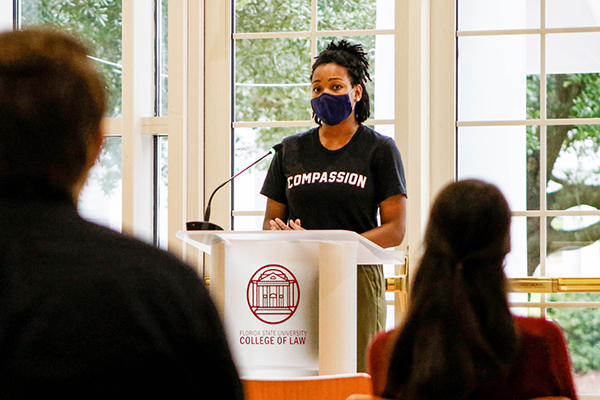Students Host FSU Law Community Vigil in Honor of Victims of Racial Violence

Black Law Students Association President Daynica Harley
speaking at the community vigil on Saturday
Last Saturday, August 29, FSU Law student leaders hosted a community vigil on campus for students to come together for a time of solemn remembrance of the tragic racial injustices our nation has witnessed. Leaders joined together with renewed purpose to pursue equal justice under the law. For safety and social distancing, the event attendance was limited and the vigil was streamed live on the FSU Student Bar Association's Facebook page.
Opening remarks were made by Student Bar Association President and 3L Chad Revis and Dean Erin O'Connor. Prepared speakers included 3L Daynica Harley, president of the Black Law Students Association (BLSA); 3L Oluremi “Remi” Abiodun, member of BLSA; 3L Corey Posey, secretary of the FSU Trial Team; 2L Kelly Kaladeen, vice president of the Multicultural Law Students Association; and 3L Walker Smith, IV, president of Lawyers for Communal Knowledge.
Before reading the names of some of the recent victims of racial violence and offering a moment of silence, Harley said it was imperative to understand that these names do not reflect the totality of racial violence in this country.
“Again and again I’ve woken up to the nightmare of seeing another Black person’s life reduced to a hashtag on social media,” Harley said. “This has to stop. The senseless killings of Black men, women and children that have been seen on the national and global scale are not isolated incidents, but rather symptoms of a greater systemic disease. In defiance of the deafening silence that surrounds racial violence, I choose to speak in honor of the names of the victims.”
Students offered words of support and spoke from their hearts about specific changes that need to be addressed to advance equity. Abiodun asked that the vigil be used as a call to action. “As law students, we need to recognize our privilege to even be in this space, use this space to recognize that institutional racism has been and continues to be built into our institutions, into our lives through policy and manifests in our daily lives.”
Published on September 4, 2020

